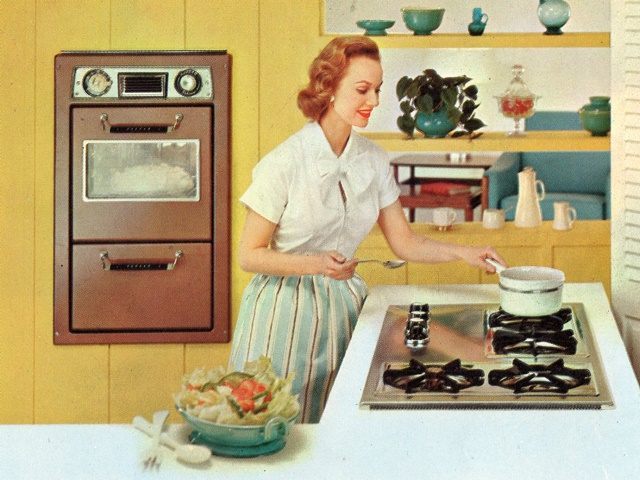A new study suggests young women are three times more likely to agree with the statement a “woman’s place is the home” than those over the age of 30, as a growing body of evidence points to the most conservative young generation in decades.
The research shows the reactions to various statements and concepts by mothers aged under and above thirty, and the results may surprise you. Although the Daily Telegraph’s new ‘Women’ (or rather, drearily feminist) section reacted to the news with undisguised contempt, it transpires young women are increasingly willing to take on traditional gender roles, are house proud and are less likely to express interest in certain progressive agendas.
Although far off a full majority, the number of women who think a “woman’s place is the home” appears to be growing, with around one fifth of under-30’s agreeing, compared to just six per cent of over-30’s. The rise in women rejecting the principles of feminism, as typified by the young people who write blogs such as Women Against Feminism is also illustrated in the study findings which found only half of young women said they were striving for “equality for all”, compared to two thirds of over-30’s.
Netmums founder and poll commissioner Siobhan Freegard interpreted the results as reflecting a revulsion by young people at the lifestyle necessary for the ‘have it all mum’ created by the Feminist movement, who endured the triple burden of keeping a home, caring for children, and working a full-time job. She said:
“I think we, and our mothers before us, campaigned so hard for equality, campaigned for feminism and campaigned for the right to have a choice and then we got a choice, then we got everything, and then we realised actually we didn’t have a choice any more. We had to work, we had to leave our babies and go back to work and a lot of us didn’t want to”.
“It really was a case of wanting something and realising when you got it that you didn’t want it after all. A lot of them are actually choosing to stay at home where they can and living on less money”.
The increasing conservatism of the younger generation is not something that has gone unnoticed by the left and right-wing alike. Guardian columnist John Harris reacted with utter horror after meeting real young people all across Britain as part of the Guardian’s Anywhere But Westminster exercise in trying to find “real politics”, and finding them to be remarkably conservative – even if they didn’t self-identify as ‘big-C’ Conservatives. He said:
“I was reminded of another very modern syndrome: the fact that as you progress down the age range, opinions about the job market and welfare state tend to harden, to the point that droves of twentysomethings sound like devout Thatcherites… this has become almost a given. Quiz people under 30, in short, and you’re more than likely to hear echoes of the kind of on-yer-bike, sink-or-swim values that decisively embedded themselves in British life when they were mere toddlers”.
In the same article, Harris cites the fascinating insight provided by Ipsos MORI’s Generations poll – research into the social attitudes held by the four present generations. Starting with the pre-wars, it moves onto the baby boomers (which right now constitutes those aged between 45-65), generation X (aged 31-44), and generation Y (all those under 31). One of the key questions asked of all age groups in surveys going back as 1987 is on welfare: “the government should spend more money on welfare benefits for the poor, even if it leads to higher taxes”.
While support for that statement is falling among all age groups, and has been for decades, it is lowest among the youngest, and if the old received wisdom that people become more conservative as they grow older holds as true, this is not a process that is likely to be reversed. Indeed, according to Ipsos MORI support for raising taxes to pay for more benefits was totally ecplised by the opposing sentiment back in 2008, and has shown no sign of recovery since.
These small-c conservative inclinations appear to be feeding through to support of the British Conservative party at election time too. Although the buzz-word of May’s election this year was ‘shy Tories’ who were credited with delivering a surprise majority, the signs have long been there to see. A 2013 poll reported on by ConHome showed the youngest generation were second only to the pre-war born in tendency to vote Conservative, and at present rates of change will soon overtake them to become the most Conservative age group. Another poll suggests the Conservative party is the most popular among university age students, and the Young Conservatives are the most active university political group.
Despite the narrative painted by the left that the last government was an unmitigated disaster that lumped young people on the scrap-heap, more young people voted Conservative and UKIP in 2015 than they did in 2010. Yet despite all that, young voters are the least likely to consider themselves politically aligned, or a fixed supporter of any one party. We live in interesting times – and we may possibly see the last socialist British government in our lifetimes.
Follow Oliver Lane on Twitter: Follow @Oliver_Lane or e-mail to: olane@breitbart.com

COMMENTS
Please let us know if you're having issues with commenting.